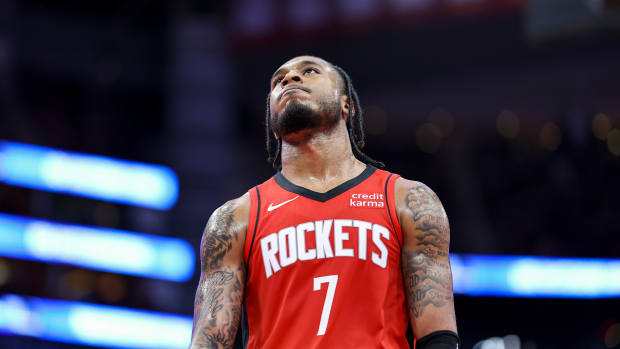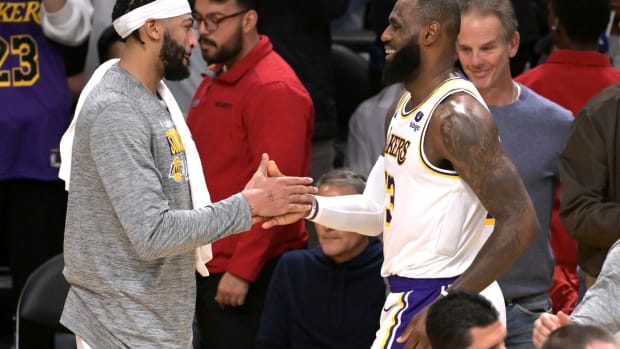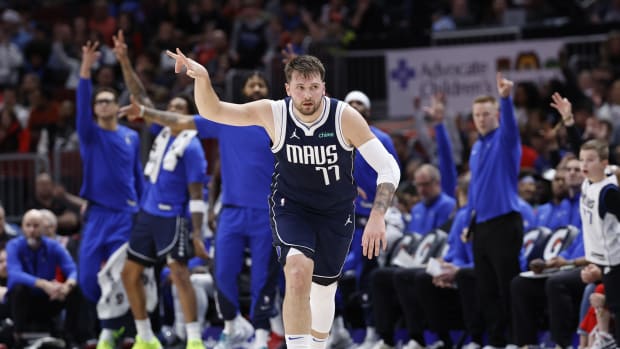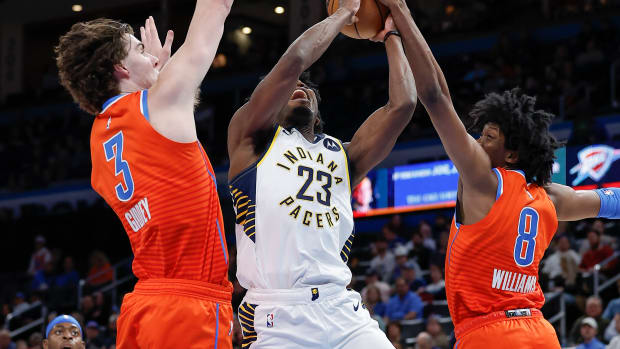NBA Draft Stock Watch: The Best Prospects Remaining In March Madness
With the first weekend of the NCAA tournament in the books, the next slate of games should be must-watch, thanks to an enormous slew of NBA prospects still playing after most of the field’s top teams avoided being upset. Whether you’re an NBA fan hoping to catch a glimpse of your team’s potential draft picks or a college diehard just trying to make sense of the landscape, we’ve prepared a guide to each of this weekend’s matchups and storylines. Below you’ll find notes and intel on five prospects to watch closely, as well as a game-by-game preview going into Thursday and Friday.
Stock Watch
Mfiondu Kabengele, Florida State
After totaling 43 points and 17 rebounds in his first two tournament games, the secret is out on Kabengele, a redshirt sophomore who was the ACC’s Sixth Man of the Year and has long been established as the Seminoles’ best long-term prospect. NBA teams have been watching him closely, and his high-energy interior play has set him apart as a player with a fairly good chance of ending up in the first round. Kabengele, the nephew of Dikembe Mutombo, has been disruptive altering shots at the basket, has developed a viable outside shot (while shooting an encouraging 76.5% from the foul line), and has enough mobility to hedge and step out on the perimeter against other forwards. Thursday’s matchup with Gonzaga’s athletic frontline will be a terrific measuring stick for him, but he has clearly helped himself as the season winds to a close. He’s gathering some momentum, and will find himself in the Top 40 of our next Big Board.
Brandon Clarke, Gonzaga
Speaking of Gonzaga, Clarke has been dominant, logging a ridiculous 36 points, eight rebounds, three assists and five blocks against Baylor in the second round. Rui Hachimura has won many of the accolades, but Clarke is pretty clearly the team’s best player. Still, he continues to be a fairly polarizing prospect among NBA evaluators. I’ve spoken with multiple teams in recent weeks who view him as more of an early second-round pick than a first-rounder, absurd stats aside. However, Clarke’s numbers have understandably been blowing up analytics models all season, and those who put more stock in the data view him as a first-round talent. The question is translation: Clarke has more blocked shots than missed shots this season (just think about that), but has been dominating as the best athlete and one of the oldest players for a team that is head and shoulders above the rest of a thin conference. Clarke’s absurd production, defensive gifts, and the fact he consistently plays so hard are impressive, but there is still some trepidation among some scouts as to how big a role you can reasonably project him into. Thursday’s matchup with Florida State will be a key barometer for him, as he has struggled to rebound in a few matchups against frontlines who can match his athleticism with size, and limit his easy baskets (early-season North Carolina and Duke games come to mind).
Naz Reid, LSU
While Reid has been a popular target of scrutiny among scouts all season, LSU’s remarkable team success has stemmed in part from a noticeable uptick in his individual effort, for which he should be recognized. While at the moment he still profiles as more of a second-round pick, his size and skill level are enticing, and when he is committed to rebounding and playing big, he’s been an impact piece. Offensively, there’s no reason he can’t become an NBA-caliber threat, although some of his skills are still more cosmetic than directly applicable to his future role. The other end of the stick is that he hasn’t blocked a shot since February, and while he deserves credit for remaking his body and buying into the team, the concerns about how you use him on the defensive end aren’t going anywhere. Reid will have a good opportunity to perform against Michigan State’s physical bigs, and potentially a huge stage to shine if LSU draws Duke in the Elite Eight.
Louis King, Oregon
Oregon might be the hottest team in the tournament, and King has been key to their late-season renaissance as a consistent threat shooting the three. His mix of positional size and skill on the wing has always been appealing, and throughout an up-and-down year for the Ducks, he has done well making a case for himself in the first round. His talent level isn’t in question, and a combine invite seems highly likely. That part of the predraft process will be important for King, particularly interviews, as teams have some concerns pertaining to his work ethic and approach that predate his time at Oregon, and will want to get to know him better before passing judgment. His medical will also be key, after a knee injury he suffered as a high school senior held him out for nearly a year. The further Oregon can go, the better case King will have, but his talent package certainly profiles well at the NBA level.
Cassius Winston, Michigan State
After watching Winston up close over the course of two weeks at the Big Ten Tournament and in Des Moines for the first and second rounds, it was hard not to come away convinced that he has the chops to be an NBA backup. It feels like in every draft, there are undervalued upperclassmen guards who end up finding early playing time, and Winston’s development into an unflappable decision-maker and consistent jump shooter has flown largely under the radar. Looking at the success of players like Monte Morris and Jalen Brunson this season, it’s easy to see Winston as another high-IQ point guard who can fit into that mold. You have to get over his body type, but he’s quicker than he looks and has developed the makings on an in-between game requisite for guys of his ilk who can’t always attack all the way to the rim. Amid a glut of second-round point guards, Winston stands out as a capable pass-first player with a real chance to stick on a roster, be it this year or next.
Thursday
(1) Gonzaga vs. (4) Florida State; 7:29 p.m., CBS
Prospects to watch: Rui Hachimura, Brandon Clarke, Zach Norvell, Killian Tillie (Gonzaga); Mfiondu Kabengele (Florida State)
As previously mentioned, the matchup of Clarke and to a lesser extent Hachimura against Kabengele and Florida State’s long, athletic bigs will be the focal point in this one. Whoever wins the paint should win this game. If those two are slowed, then Norvell and Tillie will have to make their threes for Gonzaga to win. This could be a showcase for Norvell in particular, who has the ability to stay hot and swing the flow of play. Watch this one closely.
(2) Tennessee vs. (3) Purdue; 9:39 p.m., TBS
Prospects to watch: Grant Williams, Admiral Schofield, Jordan Bone (Tennessee); Carsen Edwards (Purdue)
This is a great platform for Edwards, who has gotten back on track in this tournament, against a tough, defensive-minded team that will aim to limit him with ball pressure and run him off the line as much as possible. He still has a chance at sneaking into the first round with his scoring chops, and teams will on some level understand the context of how much heavy lifting he’s had to do. Williams was outstanding in Tennessee’s nail-biting win over Iowa, and can keep proving himself against a Purdue frontline that can match his physicality and features 7’3” shot-blocker Matt Haarms. It’s a nice opportunity for him to show what he can do in spite of his lack of height.
(2) Michigan vs. (3) Texas Tech; 9:39 p.m., CBS
Prospects to watch: Jordan Poole, Ignas Brazdeikis, Charles Matthews (Michigan), Jarrett Culver (Texas Tech)
Obviously, this will be a rock fight featuring the two best defensive teams in the country. It’s Culver’s biggest opportunity of the tournament to leave an impression. He will see a lot of Matthews, who can match him athletically, and Michigan’s scheme and the presence of Jon Teske at the rim will be a huge challenge. If Culver rises to the occasion, as he’s done all season, it will be hard not to come away impressed. There’s also an onus on Poole (who finally got hot from outside against Florida) and Brazdeikis (who struggled in that game) to find ways to score against a physical Red Raiders defense.
(1) Virginia vs. (12) Oregon; 9:59 p.m., TBS
Prospects to watch: De’Andre Hunter, Ty Jerome, Kyle Guy (Virginia); Louis King, Kenny Wooten (Oregon)
The story coming into this is Oregon, who have been on a tear and can keep up with Virginia defensively. King, as mentioned above, has been good, and Wooten’s pogo-stick athleticism and high-effort play continues to shine. Both can make statements against a tough defensive team that relies heavily on its trio of prospects. Hunter and Jerome have been steady, while Guy spent the first weekend of the tournament in a slump. Oregon’s size and ability to guard on the perimeter will be a good test for all three of them.
Friday
(2) Michigan State vs. (3) LSU; 7:09 p.m., CBS
Prospects to watch: Cassius Winston, Xavier Tillman (Michigan State); Naz Reid, Tremont Waters, Ja’vonte Smart (LSU)
The focus in this one will fall on the point guards, as Winston and Waters are both jockeying for a spot in the second round of the draft and will continue to see their strengths and weaknesses compared. That matchup should be illustrative, and makes this game worth the watch. As mentioned above, Reid will have a lot to deal with against a Spartans team that plays physical up front and likes to push in transition and force other teams to keep up. Reid has been foul-prone and excels more in the halfcourt, so how he responds to the tempo of the game will be interesting to watch.
(1) North Carolina vs. (5) Auburn; 7:29 p.m., TBS
Prospects to watch: Coby White, Nassir Little, Cam Johnson (UNC); Chuma Okeke, Jared Harper (Auburn)
Expect an entertaining, fast-paced game between two athletic, deep teams that should be must-see TV. This is a good game to focus on White, as Auburn’s smaller guards will apply heavy pressure. White’s size allows him to shoot over smaller defenders, and he’ll need to play a composed game and hit those jumpers for Carolina to be comfortable. It’s also a nice chance for Little, who enjoyed a great first weekend, to show his ability against a tough Auburn frontline.
(1) Duke vs. (4) Virginia Tech; 9:39 p.m., CBS
Prospects to watch: Zion Williamson, R.J. Barrett, Cam Reddish, Tre Jones (Duke); Nickeil Alexander-Walker, Justin Robinson (Virginia Tech)
After surviving against UCF, it’ll be curious to see if Duke faces any more junk defense against the Hokies, who beat them in Blacksburg in a game that was absent Williamson and Justin Robinson (who plays with as much competitive fire as anyone in the country). Zion and Barrett will do the heavy lifting as usual, and Reddish continues to be a baffling watch, but this is a particularly important matchup for Jones, who UCF successfully declined to bother defending. Some NBA scouts I’ve spoken with have begun to speculate whether Jones will need to stay another year at Duke to work on his jump shot, which isn’t broken, but is nowhere near where it needs to be for him to have any chance at NBA playing time. Watching Jones and Robinson go at each other will be a nice subplot to the Zion show, and if Virginia Tech is to pull an upset, Alexander-Walker has to be at his best.
(2) Kentucky vs. (3) Houston; 9:59 p.m., TBS
Prospects to watch: Keldon Johnson, Tyler Herro, Ashton Hagans (Kentucky); Dejon Jarreau, Corey Davis (Houston)
The fact that this game is on Friday will hopefully increase the chances we get to see P.J. Washington, who reportedly got his cast off on Tuesday and continues to work back from a foot injury. Without him, this will be an extremely difficult test for the Wildcats, who are far less experienced and can’t match Houston’s depth or physicality. This is the type of grind-it-out game where Johnson should theoretically thrive, and as someone whose stock is more mid-first round than lottery right now, this is key for him. Herro, meanwhile, is just 1-of-8 from three-point range after the first two tournament games, and might be due for a huge night. Kentucky will need it.





































